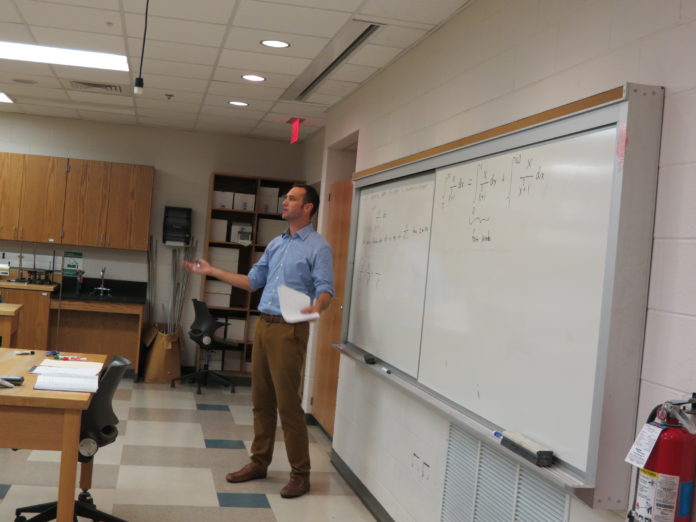Transylvania is welcoming a multitude of new faculty and staff this year. There are a total of five new professors this semester and over the next month The Rambler will be introducing each of them to the campus. This is a way for the members of Transylvania to become familiar with the new professors as well as to truly welcome them to the Transy community.
With the retirement of Dave Shannon, the math department welcomed Assistant Professor of Mathematics Michael Kelly this year.
Kelly grew up in Philadelphia and attended the liberal arts college Franklin & Marshall College for his undergrad. He studied mathematics during his undergrad and continued to the University of Tennessee to get his Ph.D. in mathematics with a concentration in mathematical ecology.
His liberal arts education was a big part of Kelly wanting to work at Transy.
“When I was thinking about jobs and what I wanted to do, I knew I wanted to be a professor. I knew I wanted a similar experience to my undergrad. I just feel like that was the college experience to me,” said Kelly. “I wanted a school where faculty know students, you can be engaged in student’s academic careers, you can build relationships with them, and it’s much more hands-on teaching.”
Kelly explained that Transy’s reputation of being student-centered was another quality that really appealed to him. He is excited to work and do research with students and teach them about the possibilities of his field.
“I have a big interest and motivation to inform students about my area of interest. I want them to know about mathematical biology and the research potential there and some of the really awesome stuff that students can do in the area, especially in the undergrad level too,” said Kelly.
Kelly is extremely passionate about mathematical biology, which he defines as “using mathematics to model and describe biological systems and phenomena.”
His main interests in the field are infectious disease modeling, natural resource management and invasive species modeling. In terms of infectious disease modeling, Kelly’s interest stems from a desire to want to help.
“Infectious diseases, they’re a scary thing,” said Kelly. “My interest in how I model them is always about the optimal way of controlling disease outbreaks or eradicating diseases. I want to help; I want to do something to inform and provide information and guidance on how to best control outbreaks and get rid of them.”
He further explained that his interest in the work relates to why he loves math in general.
“The reason I like math and why I’ve always liked math has been problem-solving. I like finding an answer,” said Kelly.
In regards to his love for math, the origin of his passion is an interesting one. Kelly describes his relationship with math as always being a “love-hate relationship,” but he remembers the exact instant he decided to major in the field.
“I remember I was struggling in a Calculus course and I remember doing a homework set and I was just mad because I couldn’t get them,” he said. “I eventually got a few answers and eventually figured out what I was doing wrong and was able to finish it. I remember finishing it and thinking I want to be a math major.”
Kelly described the feeling of finally figuring out the answer and knowing there’s a solution to the problem as what really developed his passion for mathematics.
“I haven’t always been a math nerd, but I think I’ve definitely grown into that,” said Kelly. “I really do love it now, I’m kind of obsessed.”



